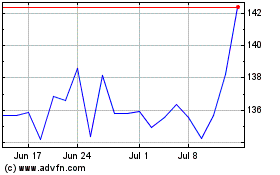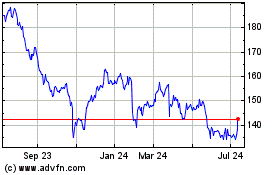By Paul Page
Sign up: With one click, get this newsletter delivered to your
inbox.
E-commerce growth is proving more profitable for United Parcel
Service Inc. than the rest of the shipping market. UPS reported a
$1.27 billion net profit in the second quarter that was 3.2% better
than the same quarter a year ago, as revenue expanded 3.8%. The
results show the company is getting more efficient at serving the
high-cost e-commerce market, the WSJ's Laura Stevens reports. But
the strength in online fulfillment and consumer spending was
countered by slowing exports due to the dollar's strength and an
inventory overhang among industrial customers that is cutting into
business-to-business shipments. The Supply Chain and Freight
segment reported lower than expected earnings in the quarter.
Revenue was up 13% in the business unit that includes freight
forwarding and less-than-truckload operations, but the operating
profit dropped more than 7% to $192 million.
Economic expansion for the rest of the year will have to go
through distribution centers. Inventory retrenchment proved a major
drag on the U.S. economy in the second quarter, with the
"destocking" by businesses shaving gross domestic product growth
nearly in half. The WSJ's Eric Morath and Jeffrey Sparshott report
the fifth straight quarterly decline in private inventories
subtracted 1.16 percentage points from overall growth, the largest
drag from inventories in two years. The question hanging over the
business world, and shipping and logistics businesses, is whether
the long-running effort to pare back stock levels will leave
companies needing to start replenishing their stocks soon. The
WSJ's Jon Sindreu writes that would boost to the U.S. economy in
the near term, but an inventory rebound will depend on whether
consumers keep buying at a strong pace, triggering a push for goods
on shelves.
The 2016 presidential campaign still has three months to go, but
the vote already seems to have come in against the Trans-Pacific
Partnership trade deal. The campaign, with its fervent anti-trade
rhetoric cutting across both parties, has dealt a potentially
lethal blow to President Barack Obama's signature Pacific trade
agreement. The WSJ's Nick Timiraos and William Mauldin write that
the chances of congressional passage now look slim after the
election, when many supporters had hoped it would be taken up, and
even under the next presidential administration. Trade advocates
have hoped that Congress will salvage the TPP in a post-election
session. But the two parties' political conventions revealed deeper
reservations, including digs by Republicans and Democrats at a
potential lame-duck vote. The U.S. Chamber of Commerce and several
companies have been stepping up their arguments for the trade deal,
but even getting a vote would require pro-trade lawmakers to
override the incoming president and populist sentiments coursing
through the grass roots of both parties.
ECONOMY & TRADE
The European Union battle with China over steel imports is
getting bigger -- and more costly. The EU is imposing new
anti-dumping tariffs on certain Chinese steel imports, the WSJ's
Valentina Pop and Eva Dou report, as the bloc shows growing
frustration over overcapacity in China's production that is roiling
world steel markets. The U.S. this year has rolled out new tariffs
on steel from China and several other countries. The duties, some
as high as 266%, have been felt across the market, cutting into
U.S. steel imports and triggering higher prices for
domestic-produced steel products that helped U.S. Steel Corp. boost
its earnings. China, the world's largest steel producer, has
doubled its exports to the EU over the past two years, while the
bloc's demand languishes below levels seen before the 2008
financial crisis. EU steel prices have fallen roughly 40% over the
past two years.
QUOTABLE
IN OTHER NEWS
Libya's state-controlled National Oil Co. plans to restart
exports from three oil ports after reaching a deal with local
guards that had blocked the facilities. (WSJ)
Ride-hailing giant Uber Technologies Inc. is giving up its
costly battle for China's riders, swapping its local operations
there for a minority stake in homegrown Didi Chuxing Technology Co.
(WSJ)
Eurozone economic growth slowed to 1.2% in the second quarter,
down sharply from 2.2% first-quarter growth. (WSJ)
A gauge of U.S. consumer sentiment dropped in July. (WSJ)
An unapproved variety of genetically modified wheat was
discovered growing in Washington state, though there are no signs
it entered commercial grain shipments. (WSJ)
U.S. employers' personnel costs rose a modest 0.6% in the second
quarter, the same as in the first quarter. (WSJ)
Improved commodity prices are expected to boost the first-half
profit at mining giant Rio Tinto PLC. (WSJ)
Apparel retailer Columbia Sportswear Co. says a 2.2% sales
increase in the second quarter was helped by growing
direct-to-consumer sales. (WSJ)
Sportswear retailer Adidas AG raised its guidance for the fourth
time this year on strong sales growth around the world. (WSJ)
Brazilian aircraft manufacturer Embraer SA swung to a loss in
the second-quarter, as the company set aside money amid a
corruption investigation. (WSJ)
The founder of Mideast courier Aramex sold his 10% stake as
investor groups led by Dubai businessman Mohamed Alabbar bought a
combined 16.5% of the company. (Reuters)
BB&T Securities is dropping its transportation coverage as
it exits equity research coverage. (CNBC)
California released a broad environmental plan with goals to
bring the state's freight operations to zero emissions. (Riverside
Press-Enterprise)
China's Wuhan Guoyu Logistics Industry Co Ltd. may miss a $60.3
million Aug. 6 bond payment because of problems at its shipbuilding
subsidiary. (Indian Express)
Vietnam's import of soybean meal for feeding pigs is soaring as
pork consumption in the country expands at a rapid pace.
(Bloomberg)
Port security grants were spread too thin to help security, the
largest U.S. port group says. (American Shipper)
Demand for multitenant warehouse space is growing faster than
the rest of the commercial property market, a new report says.
(Material Handling and Logistics)
North Carolina-based air cargo startup 21 Air is launching
operations with two 767-200 freighters. (The Loadstar)
Qatar Airways Cargo is starting weekly 777-200 freighter service
to New York and Halifax, Nova Scotia, from Luxembourg. (Arabian
Business)
New Hampshire is seeing its first-ever boom in distribution
center construction. (Manchester Union-Leader)
A British legislative report says existing measures are not
enough to tackle a shortfall in skilled truck drivers. (Logistics
Manager)
Grocery delivery startup Shipt raised $20.1 million in a new
round of funding aimed at boosting its competition against
Instacart. (Business Journals)
ABOUT US
Paul Page is deputy editor of WSJ Logistics Report. Follow him
at @PaulPage, and follow the entire WSJ Logistics Report team:
@brianjbaskin, @lorettachao, @RWhelanWSJ and @EEPhillips_WSJ, and
follow the WSJ Logistics Report on Twitter at @WSJLogistics.
Subscribe to this email newsletter by clicking here:
http://on.wsj.com/Logisticsnewsletter .
Write to Paul Page at paul.page@wsj.com
(END) Dow Jones Newswires
August 01, 2016 06:47 ET (10:47 GMT)
Copyright (c) 2016 Dow Jones & Company, Inc.
United Parcel Service (NYSE:UPS)
Historical Stock Chart
From Aug 2024 to Sep 2024

United Parcel Service (NYSE:UPS)
Historical Stock Chart
From Sep 2023 to Sep 2024
